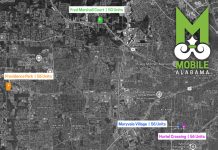Cómo afecta el próximo Censo a Alabama
Por Jessica Vaughn | jessica@gulfcoastmedia.com
Por ahora, probablemente hayas oído hablar del próximo Censo 2020, que toma en cuenta la población en un área. ¿Qué tan importante es saber cuántos ciudadanos viven en un condado? La respuesta corta es, mucho. El 1 de abril de 2020 será el día del censo a nivel nacional, pero nunca es demasiado temprano para comenzar a pensar en el censo y todo lo que podría significar para nuestra área.
“El gobierno federal de los Estados Unidos tiene más de $675 mil millones para regalar anualmente,” dijo Jean Hough, especialista en asociaciones para la Oficina del Censo. “Ese dinero se asigna a través de una cosa y solo una cosa: números del censo, cuántas personas tiene en su comunidad. El dinero sigue los números, no la necesidad. Entonces, debes contar tus números para obtener tu parte de ese dinero.”
Por cada persona que no completa su censo, Alabama pierde $1,600 por persona. Eso es dinero destinado a almuerzos escolares, programas para veteranos, Medicaid y Medicare, transporte y una variedad organizaciones y organizaciones sin fines de lucro.
También durante el Censo 2020, Alabama está en peligro de perder dos escaños en la Cámara de Representantes. “Esa sería la menor cantidad de representación que el estado de Alabama ha tenido desde 1970, y eso da miedo,” dijo Hough.
Para el Censo 2020, el gobernador Ivey espera una tasa de finalización del 90% en todo el estado. Todos los que viven en un hogar deben ser contados en el censo, no importa cuán joven o viejo sea. Todos cuentan, así que asegúrese de incluir a toda su familia cuando hagan el censo. El día que complete su censo, asegúrese de contar a todos los miembros de su hogar en ese momento. El proceso del censo comenzó a principios de este año con trabajadores verificando direcciones y confirmando que son correctas. Esto es porque en marzo de 2020, las postales de la Oficina del Censo llegarán a cada hogar con instrucciones sobre cómo hacer el censo.
“Por primera vez, puedes conectarte a internet y hacer tu censo,” dijo Hough. “Habrá un número de identificación específico en su tarjeta postal que podrá ingresar en línea en el sitio web proporcionado para que pueda completar su censo en línea. También puede llamar al censo y hacerlo a través del teléfono que figura en la postal.”
Aquellos que no hayan completado su censo en línea o por teléfono en abril comenzarán a recibir toques en la puerta, los censistas se acercarán al estilo tradicional con el fin de que completes el censo en línea o por teléfono. Deberá usar el número de identificación que figura en su tarjeta postal personal. Nunca se le pedirá a nadie información personal como su número de seguro social o información de ciudadanía al completar el censo. En cuanto a la información que se ingresa tal como dirección y número de teléfono, la Oficina del Censo no comparte información con otras entidades gubernamentales. No hay nombres asociados con el censo, y no se harán preguntas sobre impuestos, número de seguro social o ciudadanía.
“Si alguien aparece en su puerta y dice que son de la Oficina del Censo y luego pide su número de seguro social o la información de su tarjeta de crédito, entonces es una estafa,” dijo Hough.
“Cuando enviamos a alguien a su casa, van a tener una bolsa y una computadora ambos con el logotipo del censo en ellos, y van a tener una credencial con un número de identificación, puede llamar a la oficina y verificarlo.”
Este atento a su tarjeta de identificación del censo por correo el próximo marzo y consulte https://www.census.gov/ para obtener más información sobre el Censo 2020.
How the upcoming Census affects Alabama
By Jessica Vaughn | jessica@gulfcoastmedia.com
 By now, you’ve probably heard of the upcoming 2020 Census, which takes count of the population in an area. But what’s so important of knowing how many citizens live in a county? The short answer is, a whole lot. April 1, 2020 will be Census Day nationally, but it’s never too early to begin thinking about the Census and everything it could mean for our area.
By now, you’ve probably heard of the upcoming 2020 Census, which takes count of the population in an area. But what’s so important of knowing how many citizens live in a county? The short answer is, a whole lot. April 1, 2020 will be Census Day nationally, but it’s never too early to begin thinking about the Census and everything it could mean for our area.
“The US Federal Government has more than $675 billion to give away annually,” said Jean Hough, partnership specialist for the Census Bureau. “That money is allocated through one thing and one thing only: census numbers, how many people do you have in your community. The money follows the numbers, not the need. So, you’ve got to have your numbers counted to get your piece of that money.”
For each person who does not fill out their Census, Alabama loses $1,600 per person. That’s money that is put towards school lunches, veteran’s programs, Medicaid and Medicare, transportation, and a variety of other organizations and nonprofits.
Also during the 2020 Census, Alabama is in jeopardy of losing two seats in the House of Representatives.
“That would be the least amount of representation that the state of Alabama has had since 1970, and that’s scary,” Hough said.
For the 2020 Census, Governor Ivey is hoping for a 90% completion rate statewide. Everyone who lives in a household is to be counted in the Census, no matter how young or old. Everyone counts, so be sure to include your entire household when taking the Census. On the day you complete your Census, be sure to count everyone in your household at that time.
The Census process began early this year with workers going into the field and checking addresses and confirming they are correct. This is because come March 2020, postcards from the Census Bureau will be arriving at every household with instructions on how to take the Census.
“For the first time ever you can go online and take your Census,” said Hough. “There will be a specific identifier number on your postcard that you will be able to enter online at the website provided so you can complete your Census online. You can also call the Census. There’s going to be a number that you can call and do it all over the phone listed on the postcard.”
Those who have not completed their Census either online or by phone by April will begin receiving knocks on their door, Census-takers coming around the old-fashioned way. In order to complete the Census online or by phone, you will need to use the ID number listed on your personal postcard.
No one will ever be asked for personal information such as their social security number or citizenship information when completing the Census. As for the information that is entered such as address and phone number, the Census Bureau does not share information with other government entities. No names are associated with the Census, and no questions will be asked concerning taxes, social security number, or citizenship.
“If someone shows up at your door and claims they’re from the Census Bureau and then asks for your social security number or your credit card information, then it’s a scam,” Hough said. “When we send someone out into the field, they’re going to have a bag and a computer both with the Census logo on them, and they’re going to have a badge with an ID number that can be called into the bureau and verified.”
Be on the lookout for your Census ID card in the mail come next March, and check out https://www.census.gov/ for more information on the 2020 Census.

















